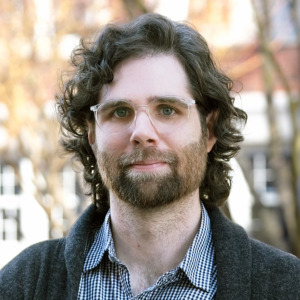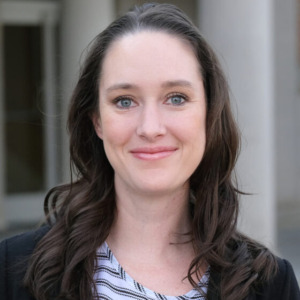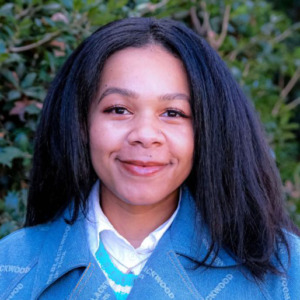Ph.D. Students

Anna Hinden
Anna is a fifth-year Ph.D. student in the Culture, Curriculum, and Teacher Education concentration, currently working on her dissertation proposal. Her research foci are mathematics coaching, professional development, and teacher efficacy. Anna works closely with Dionne Cross Francis, Ph.D., and her research team.
Email: annarh@unc.eduGoogle Scholar
Publications
- Cross Francis, D., Bharaj, P. K., & Hinden, A. (2021). “First Teachers Talk, Talk, now they Listen, Listen”: Ghanaian Teachers' Professional Readiness for Mathematics Reform. In Olanoff, D., Johnson, K., & Spitzer, S. (2021). Proceedings of the forty-third annual meeting of the North American Chapter of the International Group for the Psychology of Mathematics Education, (pp.813-818). Philadelphia, PA.
- Cross Francis, D., Bharaj, P. K., & Hinden, A. (in-press). Exploring Ghanaian Primary Teachers’ Readiness for National Curricula and Pedagogical Reform. In Research on Education in Africa, the Caribbean, and the Middle East.
- Bharaj, P. K., Hinden, A., & Cross Francis, D. (2021). The Role of Teacher Self-Regulation in Developing Students’ Social-Emotional Competencies. Times Magazine Studying and Self-Regulated Learning SIG AERA, 4(3), 3. Ryan, J, Cooper, J., Bolick, C.M., Callahan, C. (in press). Those Who Can, Teach. 15th ed. Cengage.
Presentations
- Unpacking the work of an effective mathematics coach: Attending to teachers' attributes.” Association of Mathematics Teacher Educators Conference. New Orleans, Louisiana. February 2023.
- Cross Francis, D., Bharaj, P. K., & Hinden, A. (2021). “First Teachers Talk, Talk, now they Listen, Listen”: Ghanaian Teachers' Professional Readiness for Mathematics Reform. In Olanoff, D., Johnson, K., & Spitzer, S. (2021). Proceedings of the forty-third annual meeting of the North American Chapter of the International Group for the Psychology of Mathematics Education, (pp.813-818). Philadelphia, PA.
- Cross Francis, D., Park Rogers, M., Kaur Bharaj, P., Habib, K., Hinden, A., Yeldell, J., Phillips. A., & Gatza. A. (under review). Developing climate literacy. D. Cross Francis, M. Park Rogers, A. M. Gatza, K. Engebretson & R. Hudson (Eds.), Math in action: Tasks for building mathematical literacy, grades 3-5. National Council of Teachers of Mathematics.

Eric A. Kirk
Kirk is interested in the ways science education can prepare students to address complex problems such as issues involving environmental justice, public health, and responsible uses for biotechnology. This has led to work focused on how learners think about and represent systems, use models to understand social issues, consider the perspectives of people they disagree with, and seek new information about issues as they unfold.
Email: eric.kirk@unc.edueric-kirk.com
Google Scholar
Publications
- Kirk, E. A., Sadler, T. D., Xu, Z., Elsner, J. N., Lesnefsky, R., Ke, L., Zangori, L. (2024) Socioscientific Modeling: Helping Students See Systems and Understand Messy Issues. Science Scope. 47(2), 12-17
- Kirk, E. A., Sadler, T. D., Ke, L., Zangori, L. A. (2024). Design Considerations for a Multiple-choice Assessment of Socio-scientific Systems Thinking. International Journal of Designs for Learning. 15(1), 27-37. https://doi.org/10.14434/ijdl.v15i1.34204
- Kirk, E. A., Romine, W. L., Sadler, T. D., Elsner, J. N., Zangori, L. A., Ke, L. (2023). Interest and Effort: Exploring the Relationship Between Students’ COVID-19 Interest and Information Seeking Behavior. International Journal of Science Education, Part B: Communication and Public Engagement. DOI:10.1080/21548455.2023.2293680
- Kirk, E. A., Sadler, T. D. (2023). Ditch the Debate: Preparing Pre-Service Teachers to Nurture Productive Discourse About Controversial Issues. Innovations in Science Teacher Education. 8(2). Retrieved from innovations.theaste.org
Presentations
- Kirk, E. A. (2024). Issues-Based Systems Thinking: Understandings of Complex Systems In Service of Civic Engagement. Proceedings for the International Society for the Learning Sciences Annual Meeting, Buffalo, 2024. International Society for the Learning Sciences.
- Kirk, E. A. (2023). Perspective Taking Interventions and Socio-Scientific Issues: The Case for Cautious Optimism. Proceedings for the International Society for the Learning Sciences Annual Meeting, Montreal, 2023 . International Society for the Learning Sciences.

Rebecca Lesnefsky
Rebecca Lesnefsky is a Ph.D. candidate in the Culture, Curriculum, and Teacher Education concentration, specializing curriculum development and teacher education. Rebecca focuses on brining socio-scientific issues-based instruction to middle school classrooms where she draws on her previous years of experience as a middle school science teacher. A large portion of her work is in rural classrooms which led to her receiving the Maggie Gravelle Scholarship in 2023.
Email: rrawson@ad.unc.eduGoogle Scholar
Publications
- Lesnefsky, R. R., Kirk, E., Elsner, J., Yeldell, J., Sadler, T.D., Ke, L. (in review). Exploring Resources and Reasoning Practices in Socioscientific System Modeling for Justice-Centered Science Education. CBE—Life Sciences Education: Special Issue - Equity, Inclusion, Access, and Justice in Biology Education.
- Lesnefsky, R. R., Sadler, T. D., Fortus, D. (in progress). Implementation of the Grand Challenges Curriculum in Middle School Science Education. Research in Science Education- Science Education: Fit for the Future.
- Lesnefsky, R. R., Kirk, E., Yeldell, J., Sadler, T. D., Ke, L. (2023). Socio-Scientific Modeling as an Approach Towards Justice-Centered Science Pedagogy. London Review of Education.
- Lesnefsky, R. R., Ke, L., Sadler, T. D., Kirk, E. (2023). How Middle School Students Engage in Modeling Viral Transmission. Proceedings of the International Conference of the Learning Sciences-ICLS 2023. International Society of the Learning Sciences.
- Lesnefsky, R. R., Sadler, T. D., Ke, L., & Friedrichsen, P. (2023). Instructional pathways to considering social dimensions within socioscientific issues. Innovations in Science Teacher Education, 8(2). Retrieved from https://innovations.theaste.org/instructional-pathways-to-considering-social-dimensions-within-socioscientific-issues/

Nicole Ross
Ross is a sixth-year Ph.D. candidate at the University of North Carolina-Chapel Hill. She does research at the intersection of social justice, ecojustice, and teacher education. She engages her background as a public school art teacher through arts-based learning and research methods in her research and teaching.
Email: nicolero@live.unc.eduResearchGate
Publications
- Ross, N. (2021). My Octopus Teacher, posthumanism, and posthuman education: A pedagogical conceptualization. Journal of Curriculum Theorizing, 36(2), 1-15.
- Ross, N. (2020). Anthropocentric tendencies in environmental education: a critical discourse analysis of nature- based learning. Ethics and Education, 15(3), 355-370.
Presentations
- Ross, N. (2024, December). Presentation. The finite game of humanism and the infinite potential of critical posthumanism: Places for possibility in education. Philosophy of Education Society of Australasia (PESA). Christchurch, NZ.
- Ross, N. (2024, November). Presentation. A diffractive analysis with critical posthumanism: Implications for teacher education. American Educational Studies Association (AESA). Greenville, SC.

Shuguang (Sophia) Wang
Wang's overarching research interest is to facilitate intercultural communications, especially in higher educational settings. She is passionate about interdisciplinary work and completed a Graduate Certificate in Computational Linguistics at UNC-Chapel Hill. Her dissertation used the exploratory mixed method to investigate student engagement for a diverse population in Asian Studies courses.
Presentations
- “What ChatGPT Will Bring to Us: a Systematic Review of Papers on ChatGPT in Education”, AERA, 2024
- “Learning Language but Not Only Language – A Case Study on COIL in International Settings”, ACE, 2023
- “Language as the Carrier of Culture: A Critical Look at the Chinese Language Teaching Materials”, NABE, 2023
- “Facilitating Cultural Exchanges in Cultural Courses in Humanities”, NCARE, 2021
- “Issues of and Adjustment Strategies for International Asian Students”, NCARE, 2019

Simone Wilson
Originally from Flint, Mich., Wilson is a fourth-year doctoral candidate at the UNC School of Education in the Culture, Curriculum, and Teacher Education concentration. Wilson is passionate about increasing equity in higher education, seeking to use critical methodologies to expand opportunities of joy for minoritized students and staff. Wilson is also a Licensed Master Social Worker who specializes in providing support to adults struggling with trauma, substance use disorders, depression, anxiety, and autism spectrum disorders.
Email: spwils@email.unc.eduPublications
- Lindsay, C. A., Wilson, S., Kumar, J., Byers, T., & Gershenson, S. (2024). How Teachers Learn Racial Competency: The Role of Peers and Contexts. EdWorkingPaper No. 24-968. Annenberg Institute for School Reform at Brown University.
Presentations
- Wilson, S., Byers, T., Lindsay, C. A., Ohito, E. (2024). “What’s going on?”: Understanding the recruitment and retention of black male teachers. Poster presented at the American Educational Research Association Annual Meeting, Philadelphia, PA.
- Wilson, S. & Nummelin, S. (2023). “Girl Lemme Tell You...”: Examining the Reification of White Supremacist Logics in Critically Aligned Degree Programs. Poster presented at the Critical Race Studies in Education Annual Meeting (Virtual).
- Smith, K., Tyskowski, T., Wilson, S., Abelson, J., Liberzon, I., Hampstead, B.M., Duval, E.R. (2021, March). Assessing the Relationships between Hippocampal Volume, Spatial Navigation Performance and Symptom Severity in Individuals with PTSD. Poster presented at the Anxiety and Depression Association of America Annual Meeting (Virtual due to COVID-19 Pandemic).
- Smith, K., Hampstead, B.M., Joshi, S.A., John, R.A., Goldberg, S., Wilson, S., Duval, E.R. (2020, April). Spatial Navigation Performance associated with PTSD and Trauma Type. Poster presented at the University of Michigan Undergraduate Psychology Research Forum, Ann Arbor, MI.
- Wilson, S. (2017). Improving Social Service Systems in Ghana. Poster presented at the Global Social Work Symposium at the University of Michigan, Ann Arbor, MI.

Jasmyne Yeldell
Yeldell is a fourth-year doctoral student in the Curriculum, Culture, and Teacher Education (CCTE) concentration at the UNC School of Education with a primary focus on science education. Her research focuses on the science identity formation processes of children of color in addition to equitable science curriculum development and hands-on education. Further, she is deeply committed to advancing equity through creating science curricula that speaks to the narratives of Black and Brown folx in a manner that uplifts communities of color to advocate against injustice. Yeldell also devotes her time to serve as a board member and Research Chair for THRIVE Liberation Community Center - a nonprofit with the mission to provide a safe haven for Black youth and young adults aged 13-30 to gather, learn, heal, and be.
Email: jyeldell@unc.eduPublications
- Yeldell, J., Wilkins-Yel, K., Kaur Bharaj, P., Cross Francis, D., Mahmud, A., Walters, R., Bryson, T. (2024). “Using my education to fight for my communities”: Understanding how an Equity-Based STEM Experience Cultivated Equity Ethic & STEM Identity Development among Women of Colour in STEM. London Review of Education.
- Yeldell, J., Wilson, S., Mahmud, A., Cross Francis, D., Wilkins-Yel, K. (in progress). "Goodbye to what has been...A Re-evaluation of the Black Women Experience in STEM.
Presentations
- Yeldell, J., Mahmud, A. (2023). “Would you comment on my English if I was White?” Asian American Women Experiencing STEM. Paper presented at the annual National Association for Research in Science Teaching, Chicago, IL.
- Yeldell, J. (2023). Experiences of Asian Women of Color in STEM. Paper presented at the annual Science for all Summit, Chapel Hill, NC.
- Yeldell, J. (2024). How to Retain WoC in STEM: A participatory action approach documenting the humanizing experiences of Women of Color in STEM at a PWI. Paper presented at the annual Science for all Summit, Chapel Hill, NC.
- Yeldell, J., Mahmud, A. (2024). Asian and Asian American Women in STEM: Stories of Challenges and Resistance. Paper presented at the annual National Association for Research in Science Teaching, Denver, CO.
- Yeldell, J. (2024). Retaining Women of Color in STEM: A Participatory Action Research Approach Analyzing Participant Narratives. Roundtable paper session presented at the annual American Educational Research Association Annual Meeting, Philadelphia, PA.